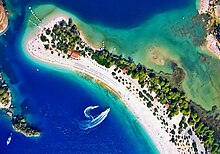
Back ساحل الفيروز Arabic Турска ривиера Bulgarian Türkische Riviera German Τουρκική Ριβιέρα Greek Costa Turquesa Spanish Türgi Riviera ET ریویرا ترکیه FA Riviera turque French הריביירה הטורקית HE Török riviéra Hungarian
This article needs additional citations for verification. (November 2024) |




The Turkish Riviera (Turkish: Türk Rivierası), also known popularly as the Turquoise Coast, is an area of southwest Turkey encompassing the provinces of Antalya and Muğla, and to a lesser extent Aydın, southern İzmir and western Mersin. The combination of a favorable climate, warm sea, mountainous scenery, fine beaches along more than a 1,000 km (620 mi) of shoreline along the Mediterranean and Aegean waters, and abundant natural and archaeological points of interest makes this stretch of Turkey's coastline a popular national and international tourist destination.
Among the archaeological points of interest are two of the Seven Wonders of the Ancient World: The ruins of the Mausoleum at Halicarnassus; and the Temple of Artemis in Ephesus.
The coastline is regarded as a cultural trove that provides background on a fascinating mixture of factual and mythological individuals, conflicts and events, and has frequently been referred to in the folklore of various cultures throughout history. As such, it is regarded as the home of scholars, saints, warriors, kings, and heroes, as well as the site of numerous well-known myths. Mark Antony of the Roman Republic is said to have picked the Turkish Riviera as the most beautiful wedding gift for his beloved Cleopatra of Egypt.[1] Saint Nicholas, who later became the basis of the Santa Claus legend, was born in Patara, a small town close to present-day Demre.[2] Herodotus, regarded as the "father of History", was born in Bodrum (ancient Halicarnassus) in c. 484 BC.[3] The volcanic mountains to the west of Antalya, near Dalyan, are believed to have been the inspiration for the mythical Chimera — the fire-breathing monster that Bellerophon slew.[1]
- ^ a b The Mediterranean Region of Turkey ; archived copy at web.archive.org. Archived November 23, 2007, at the Wayback Machine
- ^ "St. Nicholas the Wonderworker and Archbishop of Myra in Lycia". oca.org. Retrieved 13 May 2017.
- ^ "Herodotus". Archived from the original on 14 November 2007. Retrieved 13 May 2017.